Test Owner
Interviewing can be a tricky business and without the right questions it can be very difficult to find out candidates’ past behaviours and therefore predict their future ones.
This list is by no means comprehensive and you should be asking many more, but if you’re not asking these questions already then try them and see what results you get.
What professional achievement are you most proud of?
Someone giving an unimpressive answer here is obviously a big worry, strong candidates will have something they want to tell you and be able to speak easily about their involvement in it. Try to get as much information about this as possible: Who was involved…What challenges did you face…How did you overcome them…….etc. etc. Be careful of too many ‘we’s’ in their answer, you are looking for an individual playing a critical part in this, not a project he or she was merely involved in.
Describe a situation where others you were working with on a project disagreed with your ideas.
A good interviewee may use the STAR technique to answer questions such as this so that you clearly understand the challenge faced by them. The response should allow you to be able to assess a number of competencies including teamwork, dealing with conflict and leadership.
Tell me about a tricky situation you have faced at work recently and how did you deal with it?
This is another question that should lead to deeper analysis. Not only does this tell you about the type and severity of challenges they face at work but also which issues they find more difficult to deal with and how they solve problems.
If we were taking a reference on you and we asked your boss to describe you in one word what would he or she say?
This question is one of my favourites, it’s like an injection of truth serum; interviewees have to be honest because they know that you will be taking references and you may well ask their managers that very question.
Have you got any questions?
Ok, so I’m sure you ask at the end of every interview but often this is seen as polite conversation after the real questions and not part of the assessment. This shouldn’t be the case – as an interviewee the standard of these questions is often an insight into the person – have they researched your company well and considered the challenges of the role? Are they seriously considering taking a position with your company or are they just leveraging a counter offer?
If you’re not sure of the questions you should be asking, a good starting point is thinking of the key competencies you are looking for in the potential hire and writing down some questions that will ascertain this.
I recruit in the Marketing industry. Feel free to give me a call for more information, email matthew.finlay@calibresearch.co.uk with your favourite interview questions and keep an eye on @CalibreMatthew for more blogs.
Calibre Search is a specialist recruitment consultancy operating in the Built Environment (Consultancy & Construction), HVAC / Refrigeration, I.T. and Marketing sectors throughout the UK.
Calibre Search in the press!
Calibre Search are in the press again with Simon Owen giving his opinion on how to attract and retain staff in October’s edition of Business Insider.
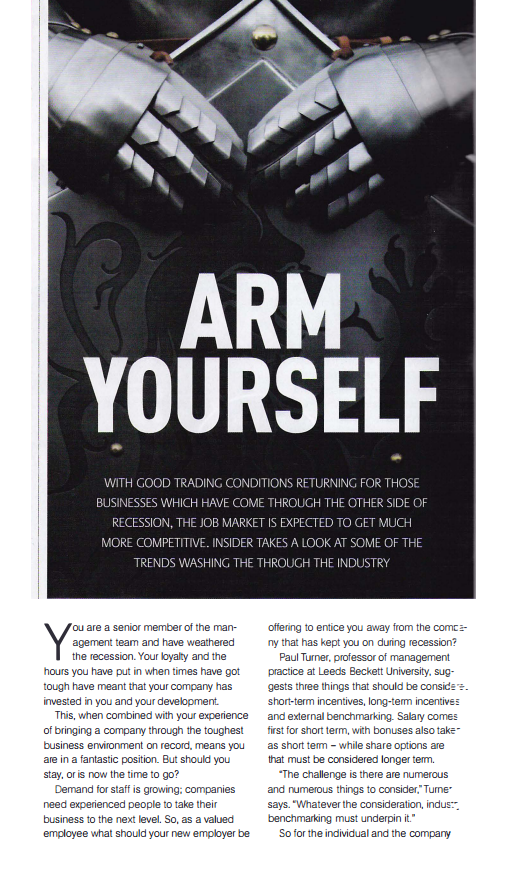
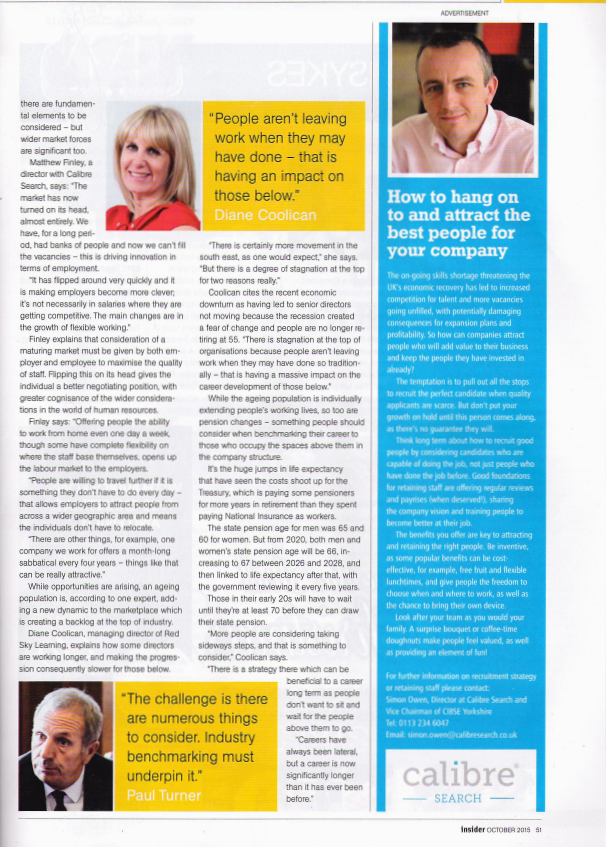
Calibre Search have been in the press again with the following article appearing in the Business Insider.
The current skills shortage in many industries does not need to hold back your business. Simon Owen, director of Calibre Search, offers guidance on how to attract and retain staff.
Finding and retaining professionals to add value to your organisation and contribute to its growth should be at the heart of every business plan. Unfortunately, too many management teams prioritise the customer, or products and services, over the teams delivering them. They realise too late they don’t have the right strategy in place for resourcing expansion.
Post-recession and throughout the economic recovery, the companies that have thrived are the ones which value their people. Yet, across all sectors, vacancies continue to go unfilled, expansion plans falter and delivery to clients whilst remaining profitable is all the more difficult. So how can you attract people who will add value to your business, keep the people you have invested in already and, most importantly, develop your image as an employer of choice?
Attraction
When quality applicants are scarce, the temptation is to pull out all the stops to recruit the perfect candidate. The danger with this is that your growth may be on hold until this person comes along, and there’s no guarantee they will. Offering an inflated salary could upset your existing team, so make sure not to rock the boat as you could risk losing some of them as well as the new recruit.
Think long term about how to recruit good people into your business. Look at people who are capable of doing the job, not just people who have done the job before. Alternatives include:
- Apprentices. A lot of companies wish they had invested in more junior people during the downturn. Apprentices can be loyal, motivated and whilst they take some time to get up to speed, you can tailor their training to your own processes and procedures.
- Veteran professionals who may consider working on a part time basis.
- Returning professionals who may have been out of the industry a while and who are keen to find organisations willing to provide training for them to get up to speed.
Retention
It’s important to honour promises made at the outset of the relationship. Be honest about your expectations and have regular reviews discussing career plans, giving clear direction both for daily responsibilities and future opportunities. If your team share your vision and successes, they are likely to be more motivated to contribute ideas and stay committed.
When it comes to personal and professional development, in the words of Sir Richard Branson: “Train people well enough so they can leave, treat them well enough so they don’t want to.”
Think about the benefits you offer; could they be better suited to your employee demographic? Be inventive, as some popular benefits can be quite cost-effective, for example, free fruit, flexible lunchtimes, time off to do community work etc. Be flexible if you can; many people are turned on by having the freedom to choose working times, working locations such as home offices, and the chance to “bring your own device”.
Keep up-to-date with market rates for the roles your company offers. It is far better to offer a pay rise before you are asked; there is less time for damage to be done too.
If your team is happy, encourage them to share their experience, which will help to improve your chances of becoming the employer of choice. You should consider having a section on your website about your team with soundbites from them about their career journey at your company.
Become the employer of choice
And finally, following on from asking your team to share their experience of your workplace, you should let the world know more about your company’s personality, vision and values by sharing your approach to training and recruitment, as well as any community work, volunteering, and fundraising activities.
If you have a corporate social media presence, make it a human one. Have conversations, thank people, be interested and interesting.
Make your mark on your sector by getting involved with events relating to your industry. Awards are a great way to celebrate success and help you stand out in a crowded marketplace.
Enhance your reputation by building strong relationships with influencers including the media as they can provide powerful third party testimonials about your company. Invite the media in, or go to them with your stories – work with a PR advisor if necessary.
Give some thought to the look and layout of your workspace. Don’t be afraid to spruce things up; a lick of paint or a change of pictures can work wonders!
Look after your colleagues as you would your family and encourage them to do the same. A surprise bunch of flowers or box of chocolates help make people feel wanted and valued, as well as providing an element of fun!
The full article can be read here: http://goo.gl/x48D5D
Following a new ruling by the European Courts to say that the time spent by workers who do not have a fixed place of work should class their travelling time to and from sites as ‘working time’ there has been a lot of confusion as to how this will affect staff and companies alike.
The confusion is particularly focused towards – will this have to be paid in addition to the workers current salary?? This has obviously left companies wondering where the funds for this additional cost will come from.
A number of HVAC companies I have spoken with since hearing about this have been worried as to how this additional cost will be funded IF this time has to be paid as they tender for business without this cost. Some of the smaller companies have been worried as they simply do not have the funds for this extra cost.
On the other side of the debate a lot of engineers I have been speaking with have been under the impression that they are due a significant increase in pay as ALL jobs that DO NOT have a fixed place of work will now have to be paid for their travel time.
The following article from the Recruitment Employment Confederation should help shed some light on this:
If you have any questions on this subject or would like to speak to John regarding the recruitment of HVAC staff, at any level, please get in touch on 0113 234 6047 or john.cassidy@calibresearch.co.uk
'ECJ rules that travelling time is 'working time' for workers with no fixed place of work'
The ECJ has responded to a request for a preliminary ruling by a Spanish Court as to whether the time spent by workers who do not have a fixed or habitual place of work, travelling between their homes and the premises of the first and last customer designated by their employer constitutes 'working time' within the meaning of the EU Working Time Directive (No.2003/88).
The ECJ has ruled that it does.
The case involves a group of workers who are engaged by Tyco Integrated Security (Tyco) to install and maintain security systems at the homes and commercial premises of Tyco's clients.
The workers each have a company vehicle which they use to travel from their home to the client locations and to travel home at the end of the day. Previously workers had to travel to a regional office to collect both the vehicle and their instructions for client visits. At that time, Tyco regarded the time spent from the point they collected the vehicle as working time, until they returned their vehicle.
On closure of the regional offices the operation was rearranged with the result that workers retained the company vehicle at home and received their instructions the evening before each working day. Tyco then switched to treating the time the workers spent travelling from home to their first client and from the last client NOT as working time, regarding it instead as a rest period. Working time commenced from the point at which the workers arrived at the first client's premises and ended when the worker left the last client's premises.
The ECJ regarded the workers as being entirely at Tyco's disposal and not free to use their time freely while travelling to and from clients.
The ECJ decision follows and earlier opinion given by the Advocate General in June 2015 who also reached the same conclusion. At that time, the UK and Spanish governments objected on the basis that this would lead to additional costs for employers.
The judgment refers to these objections, but asserts that the travelling time must nevertheless be treated as working time, but that being the case, Tyco remained free to determine how their workers should be remunerated during this period. The Working Time Directive does not deal with payments that workers should receive for working time, so this does not directly affect payment to workers. However, the case will impact on the impact of rest breaks and rest periods that workers are entitled to.
The Working Time Directive deals specifically with working time provisions such as entitlement to rest breaks, rest periods. It does not deal with pay. So, this will not affect the manner in which National Minimum Wage (NMW) is calculated because the NMW legislation uses different criteria to determine what time workers are entitled to be paid for an is entirely domestic legislation (unaffected by the decision of the ECJ). There will however be a cost element for employers because for the specific category of employees that this judgment applies to, their working day will be longer and there will be a need to make arrangements to cover extra rest breaks, rest periods.
Top Job Interview Tips
Calibre’s Top Tips for Job Interviews
Congratulations! You’ve secured that all-important job interview, so how can you turn this opportunity into the next step up your career ladder? The key thing to remember is no-one will interview someone they don’t think can do the job. This is your opportunity to demonstrate you are the best candidate. Here are our top tips to help you outperform your competition…
Remember the interviewer is human too!
Don’t forget that the interviewer is human too and they have a problem to solve. They will be as keen for you to be the right person for the job as you are to be that person, so relax and enjoy the conversation – you will then truly give your best. Most clients look for certain traits in interviewees – positivity, enthusiasm, energy, client focus, teamwork, innovation - so have a little think about which soft skills the client will be looking for and act accordingly.
Do your research!
Visit your potential employer’s website to get an overview of the organisation and how they promote themselves. Also, search for their company name in Google news or similar to bring up anything that’s been in the press about them; it’s amazing just what you can find out!
You should also research the person you are meeting. Google is a good start, type their name in quote marks first (“David Jones” for example), then if that brings back too many or random results, try adding their company or loaction.
On Linkedin you can search by the person’s name or the company. A lot of people will have their full CV on the site and it can give you an insight into the individual and their background that might also help you identify projects/people you have in common you may not have been aware of otherwise.
Make your experience relevant
Re-visit your projects and roles from the last few years and think about what they were, what you achieved and how they could help you in this role. Don’t focus too strongly on anything from five or more years ago as it’s classed as too far in the past by many interviewers who may feel you haven’t achieved anything you are proud of recently. Be prepared and happy to talk about what you have done, as being evasive or constantly wandering off-subject never creates a good impression. If it helps, take some documentation you think will be useful; for example a survey, a piece of work or a report.
Be prepared with quick (and impressive) answers to common questions
Review your CV just before the interview so you’re familiar with what the interviewer may refer to when they meet you, what you have talked about and any areas where you’ll need to highlight specific experience or knowledge to prove synergy with the position. Have a think about, or even Google, standard interview questions. These nearly always come up and having answers ready to questions like: what are your strengths, what are your weaknesses, tell me when you have failed at something, what sort of leader are you etc can be quite tricky when you have to think under pressure. On a similar note think about the technical questions they may ask and how you would respond to these.
Prepare your own “revealing” questions
Prepare a couple of questions about the following: the role and what it involves; the company and its plans for the future; and the interviewer’s role and what they are looking for from people in their team. You can impress with your questions by asking something which is insightful, and which reveals more about your skills and experience or ambitions. Use your knowledge of the company and interviewer to ask some well-chosen and considered questions to ensure you give the best possible account of yourself.
As an aside, don’t ask about money on a first round interview unless the client first mentions it, and then be truthful about what you are looking for ideally and what you would accept.
Critique your performance
Once the interview has finished and you are somewhere quiet, take a few moments to reflect on the interview, what was discussed and your answers, before making some notes. This will help you give your recruitment consultant a thorough briefing about the interview and in particular any questions you felt went especially well or you found difficult. When they speak to the client, they’ll be able to use this information to give your feedback and address any aspects where you didn’t perform as well.
Follow-up with a thank you
Consider sending the client a thank you email, whether you feel the interview went well or otherwise. Wondering why? The employer may well be thinking of you at the same time as several other people, so what better way to make a final impression and put your name to the forefront of their mind? The fact you did will stand you in good stead for future roles with your interviewer, even if you are not successful with this one, whether they are still working for the same organisation or have moved on themselves.
Calibre Search Expands Construction Team

We’ve been in the press again with articles in Bdaily, Recruiter and OnRec. The article is below.
Specialist recruitment consultancy Calibre Search has strengthened its construction division with the appointment of experienced consultants Sam Sykes and Elliot Barwick.
Leeds-based Calibre’s construction division, headed by Mark Brennan, works with blue chip and SME clients in Yorkshire and beyond to help them attract the best talent. Increased activity in the region’s residential construction market has resulted in a flood of projects requiring personnel across all levels.
Newly-appointed Sam Sykes has seven years’ experience working within the built environment and will specialise in the placement of white collar managerial and commercial personnel. Elliot Barwick joins as the team’s dedicated construction contracting consultant, supplying both contract and permanent professionals including managers, surveyors, planners and directors.
With the imminent start of major schemes in Yorkshire, and building on a sound foundation of SME business, we have already seen an increase in activity with contractors recruiting for all levels,” said Mark Brennan.
“Order books are filling up and the skyline, particularly in Leeds, is a clear indication of the amount of investment and building work going on in the region. We have an excellent reputation in the built environment, and these key appointments will enhance our experienced and well-connected team who are dedicated to helping the region’s builders attract quality and qualified personnel, as well as candidates make the most of available opportunities.”
Calibre Search doubled in size last year, as demand soared for its services on the back of the market recovery. With offices in Leeds and Manchester, the 19-strong team specialises in recruitment for the built environment (construction and consultancy), HVAC/refrigeration & building maintenance, IT and marketing sectors.
Now, after a record 2014, Calibre has almost outgrown its Leeds office at Victoria Wharf, and is on the lookout for a new home for the rapidly expanding business.
To contact the team, visit http://www.calibresearch.co.uk/contact-us.
To view the articles in their original formats follow the links below
http://www.onrec.com/news/news-archive/growing-recruitment-firm-expands-construction-team
http://www.recruiter.co.uk/news/2015/07/calibre-search-appoints-barwick-and-sykes/
https://bdaily.co.uk/entrepreneurship/03-08-2015/1438338921-this-weeks-yorkshire-appointments/
Yorkshires construction secrets discovered…?

Blog Post by Simon Owen, Vice-Chairman of CIBSE Yorkshire and Director of Calibre Search
I don’t know about you, but while I knew Yorkshire is a big county, and that we have a lot of building and construction work centred within the area, I didn’t know just how good we are at it. That changed on Friday…
At the Construction Excellence Yorkshire and Humber Awards people from all branches of the construction and engineering family came together to talk about what they do and celebrate what they have achieved over the last year. I was the guest of Tekla and it wasn’t until I was chatting with Marian Thomasson and Jill Willoughby that I realised Yorkshire’s history of innovation goes beyond the building as a whole, but also to the local manufacturers; Hepworth Building Products were at the front end of developing push fit plumbing fittings while NavisWorks is a development of a package created in Sheffield.
Kicking off the evening, Chris Gorse, Director and Professor of the Leeds Sustainability Institute and Centre for the Built Environment at Leeds Beckett University discussed with pride and passion the developments that they have been involved with as part of his opening speech, from the students graduating, the establishment of ThinkBIM, GreenVision, Construction Knowledge Exchange while he neglected to mention the launch of BIM4SME’s being held in the region or that the University acts as the central hub for the UK Living Building Challenge team. He made up for it though by talking about the close relationship that they have with industry and the shared enthusiasm for carrying out research to find a better way of doing what we do.
The thing I’ve admired about all of the groups Chris mentioned is that they are accessible; there is an “everybody welcome” approach so that no matter what your base level of knowledge you will enjoy the event and won’t feel daft being there. The other thing that is special about them is that they are all shared via through social media, web casts and tweets – possibly not a secret, but worth knowing if you have an interest in the subject but were a bit nervous about coming along.

CEYH Chair, Tom Oulton, and host, BBC Look North’s Amy Garcia, taking selfies
The presentations themselves were inspirational; for instance Alison Watson of Class of Your Own introduced three of her students who had been working with Cundall, Mott MacDonald and Laing O’Rourke. They talked about their course, their plans for the future and how they have been supported by the companies that they worked with. There was a huge applause for the Alison as she is well known and recognised for being a trail blazer, but this was almost dwarfed by the one after students had presented; all 350 people in the room could sense their enthusiasm for what they have learned and could see how the “Design Engineer Construct!” programme has the potential to change how we bring people in to the industry.
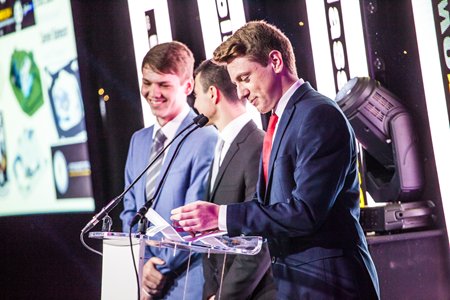
Luke, Brad and Daniel of A Class of Your Own presenting
There was main contractors, sub contractors, design consultants and industry specialists all rubbing shoulders with client organisations such as East Riding of Yorkshire Council, Northern Rail and Yorkshire Water; it is hard to imagine a more diverse group of people gathering, talking and celebrating. Speaking with Mark Randerson of SH Structures, he told me that the awards are a crucial part of marketing their business; they design, install and manufacture steel structures, but not the standard stuff, they do the work where you look and wonder “just how on earth did they do that”. When they try to get on the supplier list for main contractors they struggle as procurement departments say “we have 6 people on the list, we don’t need anyone else”. When as Mark said, “all I want is for people to remember us when they need to deliver the out of the ordinary”, the awards help as people know that they are the company that won this award, was nominated for that award or completed projects that change local landscapes such as The Kelpies. Procurement may have six people on their list, but there probably aren’t six companies in the country that can deliver projects of the nature that specialists such as SH can.
Above all it changed perceptions and proved that every project being delivered by every organisation has scope to do something amazing and break new ground. Lovell won the award for Health and Safety on their Hull re-roofs project demonstrating that glamour is not required. The Heritage award was won by East Riding of Yorkshire Council for their Sewerby Hall Access Project showing that a high profile and international brand is not essential while the Integration and Collaborative Working award went to Kier and the York Teaching Hospital NHS Trust, marking how the focus of the property team remains on delivering the best facilities they can in the midst of the various wrangling’s and politics.
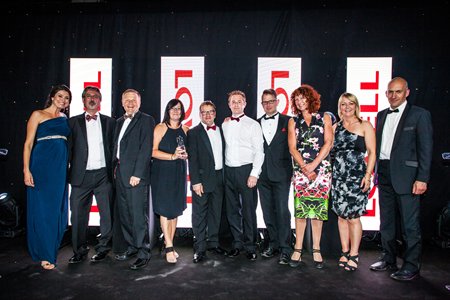
The East Riding of Yorkshire Council team collecting their award
It would be great to see more public bodies, housing schemes (low energy new builds perhaps?) and what some would say left field works represented next year and really spread the word of just what is being achieved behind so many office doors and site entrances.
For me, one thing is for sure and that our host for the evening, Amy Garcia, summed it up well when she said that “the future of the industry is in safe hands” after hearing Luke, Brad and Daniel of Class of Your Own speak. She’s right, especially if the news is as good in other regions as it is in this one…
Simon Owen
Please see original post at www.cibseyorkshire.org and on http://ckegroup.org/cexcellenceyh/?p=937
Full details of all the winners and more pictures from the evening are available here:
http://ckegroup.org/cexcellenceyh/?page_id-457
York Races!
Last Friday Calibre got dressed up and headed to York Races to enjoy our annual summer party.
We were lucky enough to spend the day in the Knavesmire box where we were looked after by some lovely hostesses offering us fabulous food and just a ‘small’ amount of alcohol ;)
Calibre got us all involved in the betting fun with a few sweepstakes and we had a few goes ourselves. Most people seemed to end up around even apart from our construction consultant Elliot who won the most – he still woke up the next morning with none of his winnings though!
All in all we had a fabulous day, please see a few pictures below.
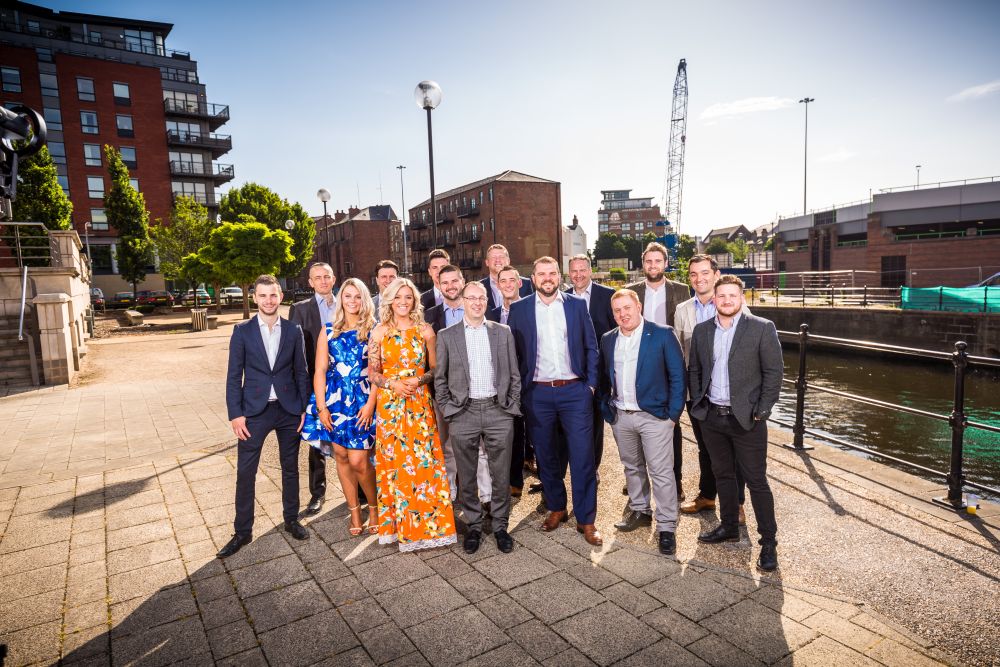





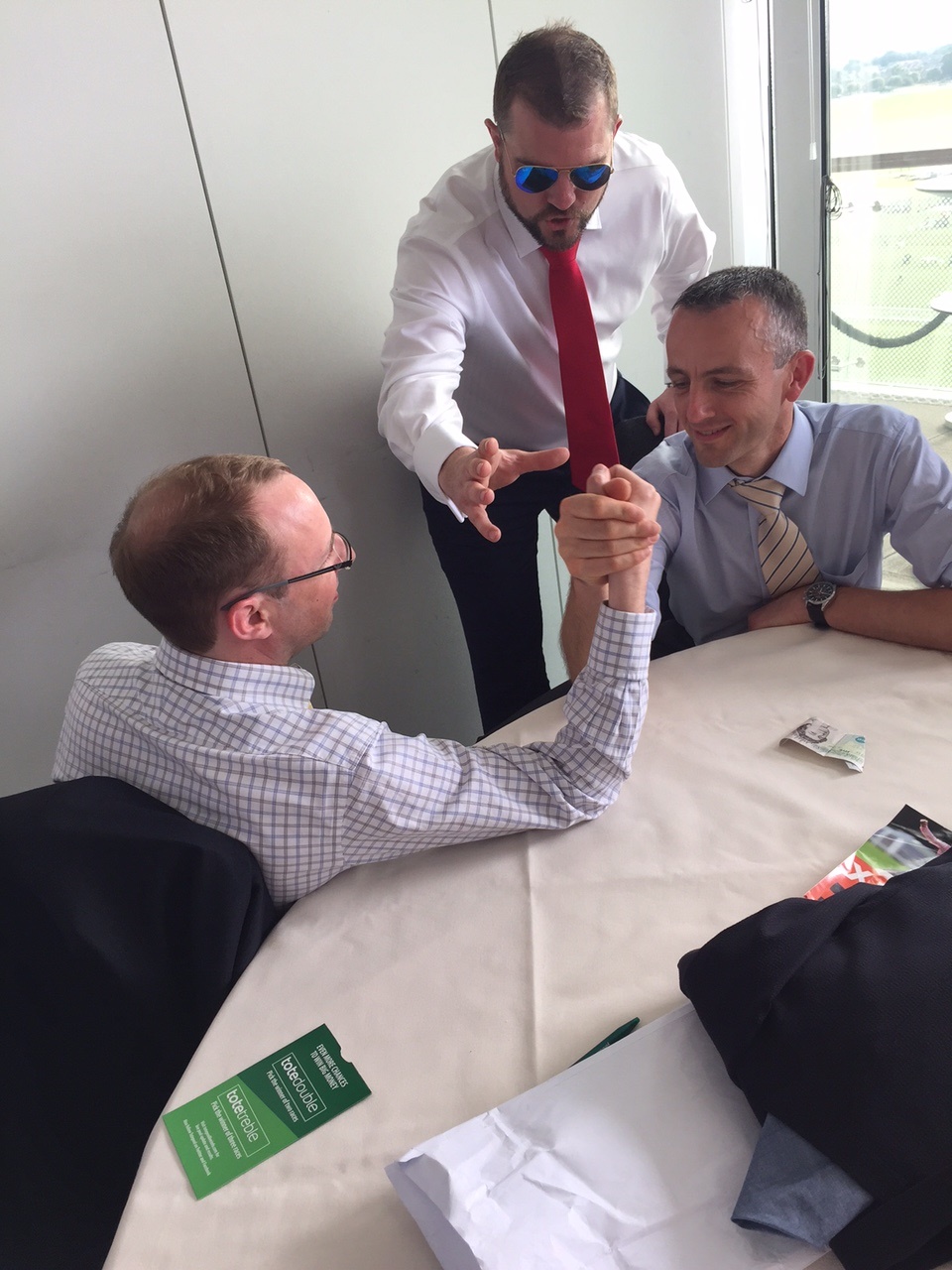

 #
#
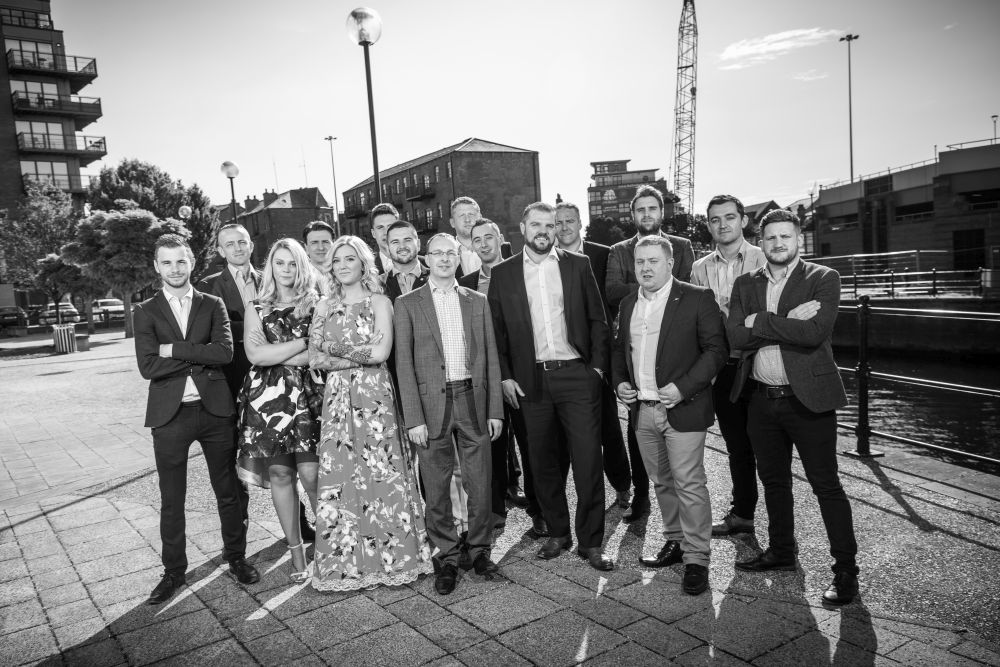
The Helvellyn Walk & Camping!
Last weekend Calibre took to the Lake District to tackle the Helvellyn walk and what an amazing experience it was!
Unfortunately we didn’t have the best of weather but that didn’t dampen our spirits. It took us 5 1/2 hours to walk 8 miles and climb some scary terrain including scaling Striding Edge and Swirral Edge. Out of the 11 that attended only 5 managed to complete it after underestimating how high it actually was!
Everyone enjoyed the experience and we celebrated with a few beers and some pub grub before retiring to the campsite in Glenridding where some people had a better night's sleep than others!
Here are a few pictures from our day.

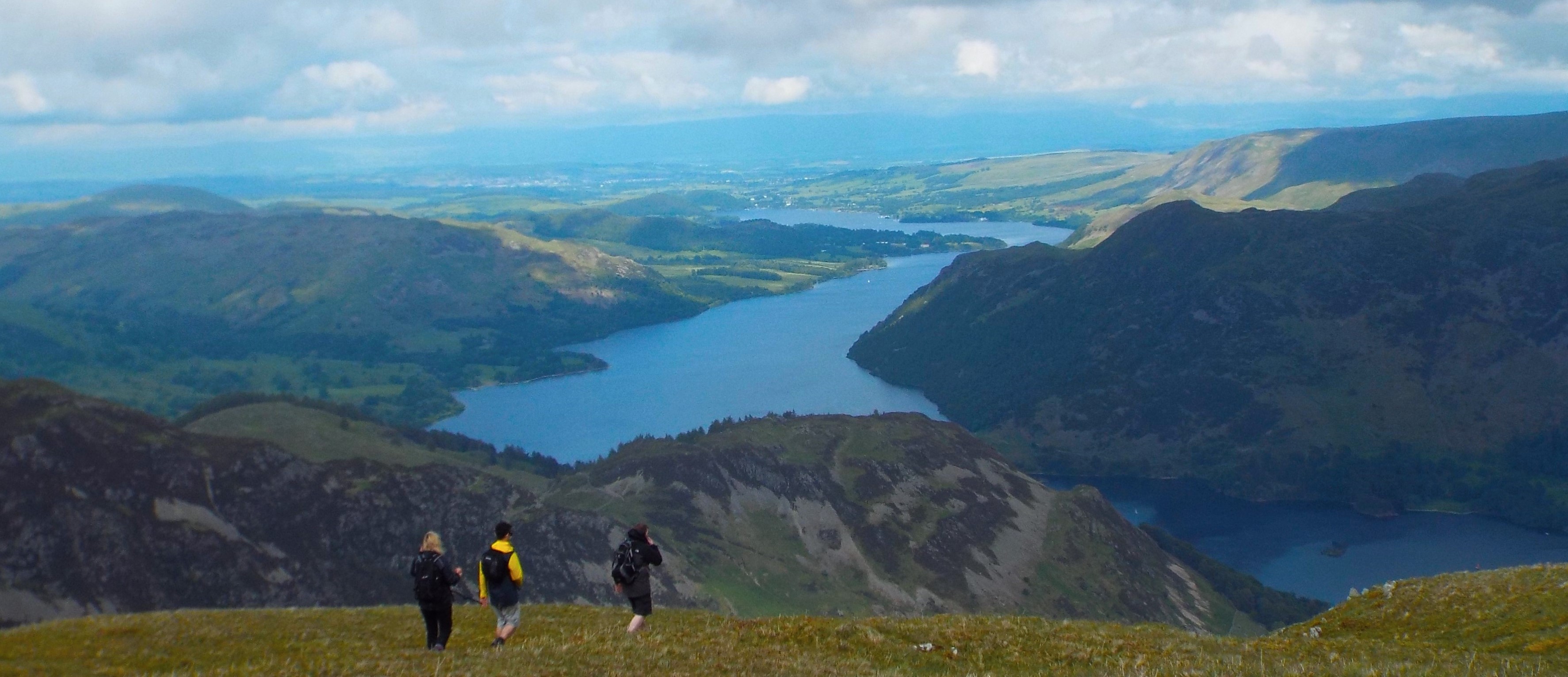
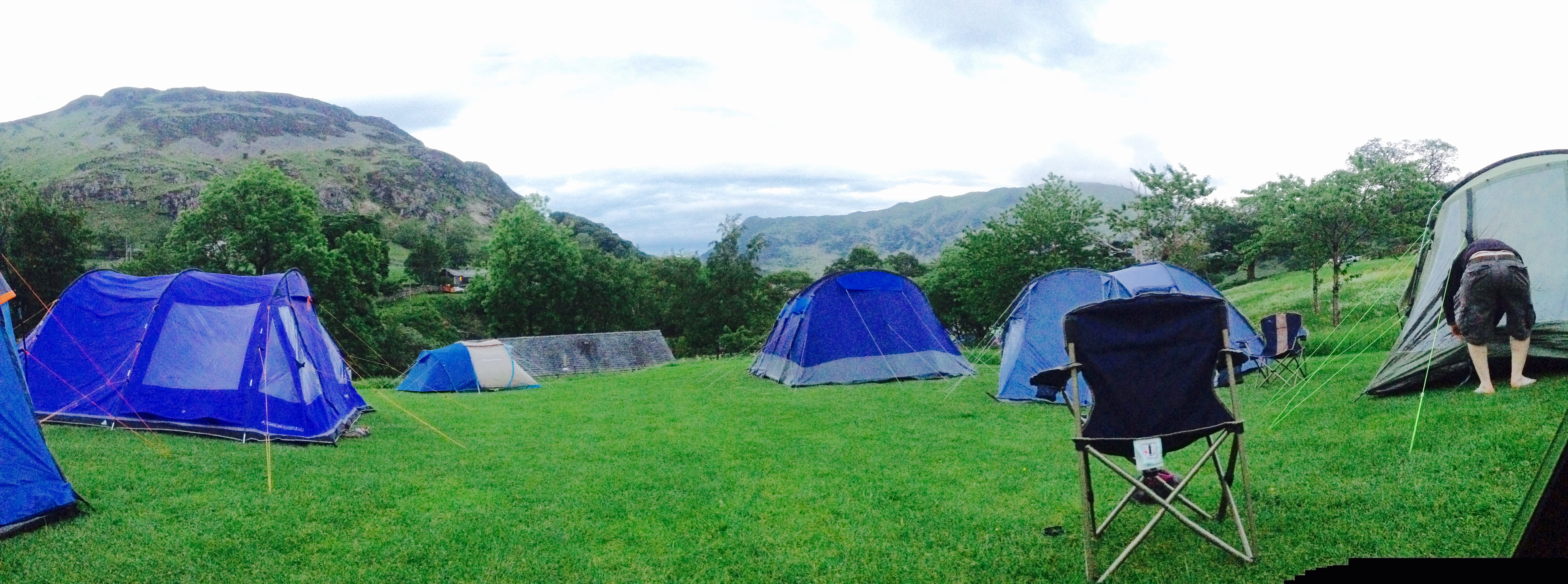
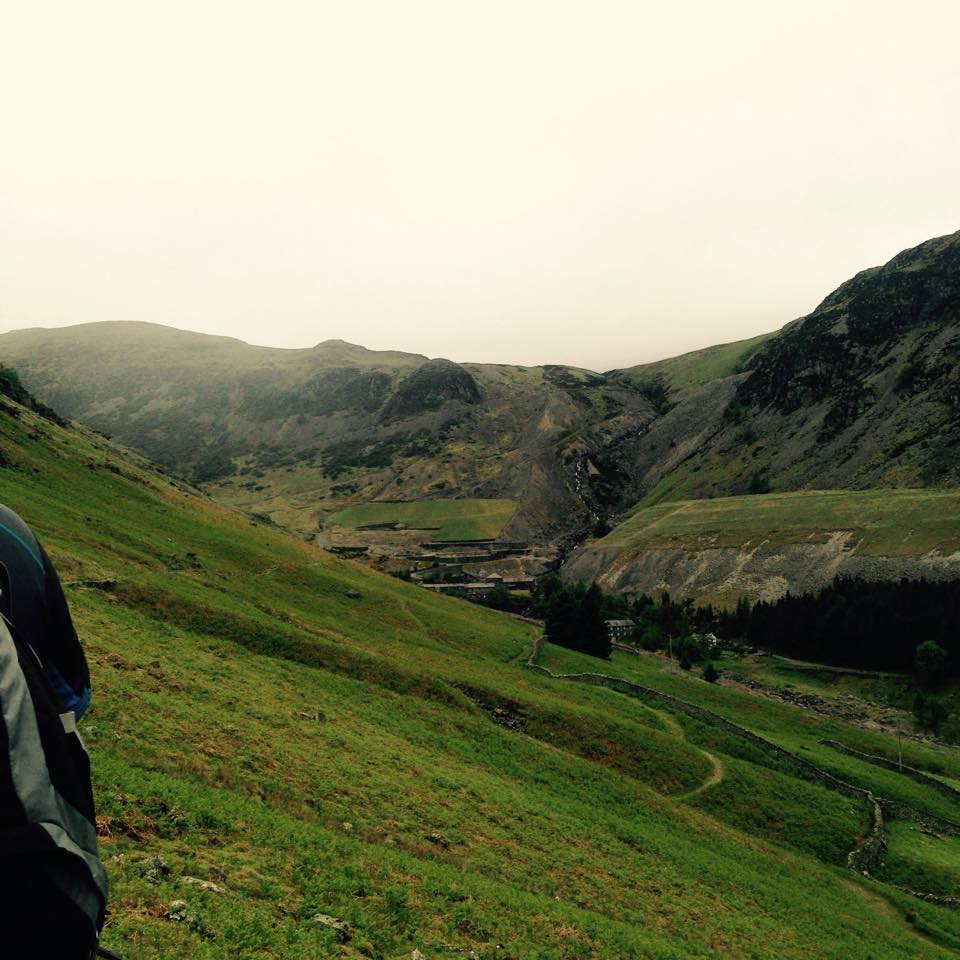
Finally, our thoughts go out to the family of the man who lost his life on the mountain that day. We saw some of the attempted rescue unfolding unaware of how serious the situation was. We understand as many as 50 rescuers were involved including the man’s son, passers-by, the Sea King helicopter crew, the Great North Air Ambulance and the Penrith Mountain rescue Team who should all be commended for their assistance and bravery.
CATMAN!
In a rare newspaper interview (!) Our director Richard Robinson shares some of his most personal ambitions and also talks about the things that are important to him... You can read his interview in full in the Yorkshire Evening Post, or next time you see him you can ask him about his love of modern and ancient history.
We're happy to see Calibre getting another mention in the Yorkshire media!
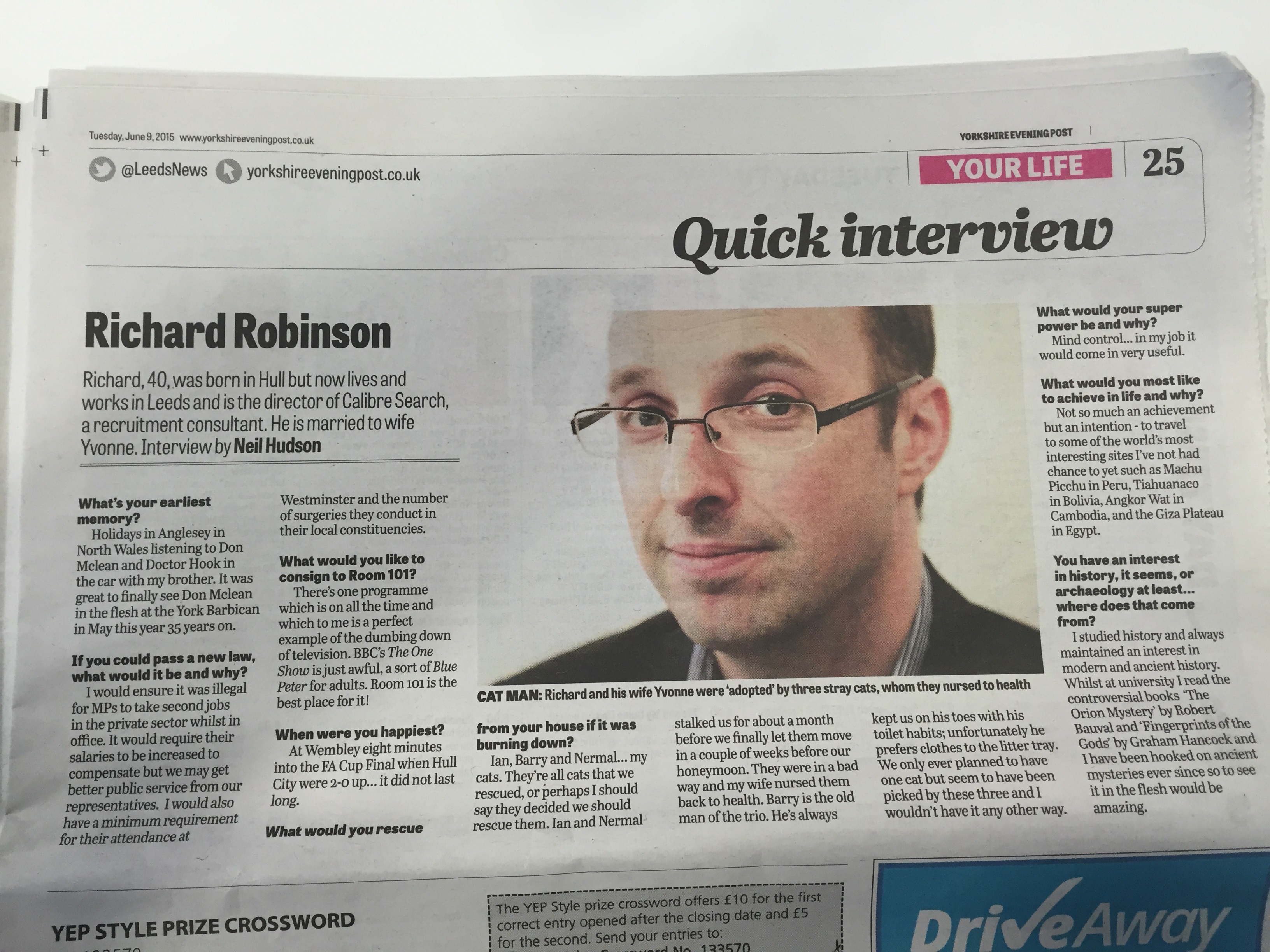



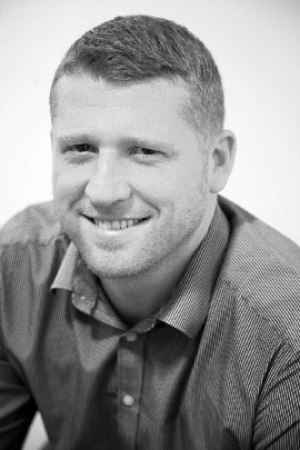




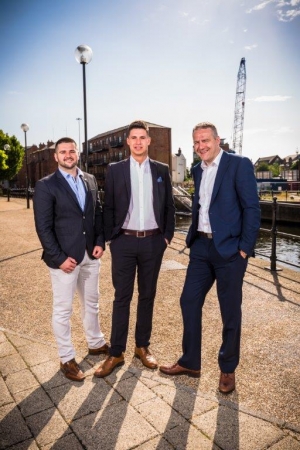
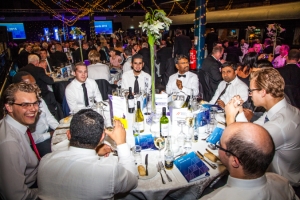







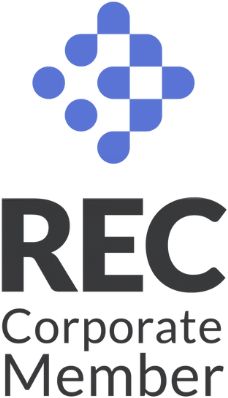

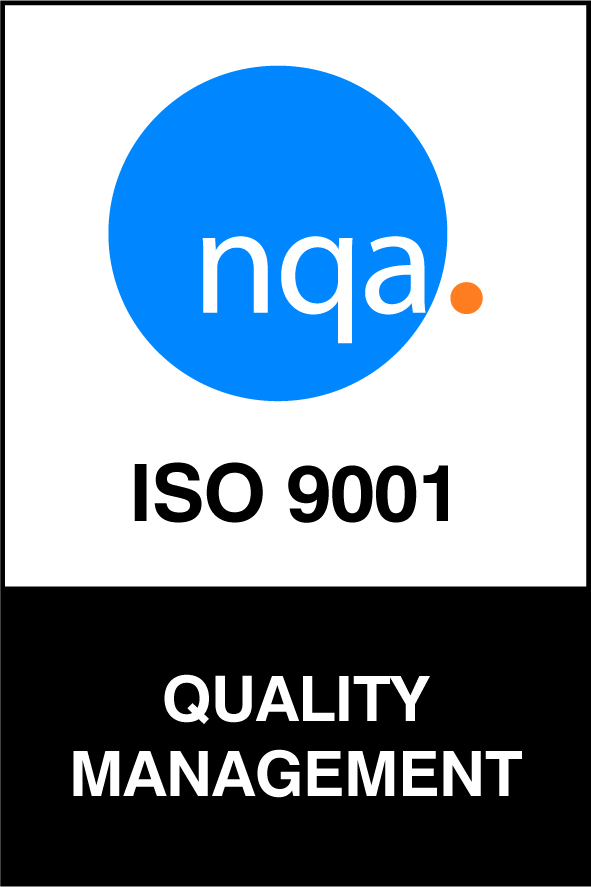

We had a couple of great conversations about ...